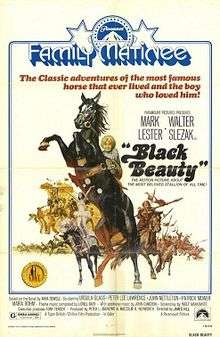Black Beauty (1971 film)
Black Beauty is a 1971 British drama film directed by James Hill and based on Anna Sewell's 1877 novel of the same name. It is the fourth feature film adaptation of Anna Sewell's story. Lionel Bart provided the rousing score.
| Black Beauty | |
|---|---|
 North American Theatrical release poster | |
| Directed by | James Hill |
| Produced by | Peter L. Andrews Artur Brauner Malcolm B. Heyworth Executive producer: Peter Hahne Tony Tenser Harry Alan Towers (uncredited) |
| Written by | Anna Sewell (novel) Wolf Mankowitz (screenplay) James Hill (additional dialogue) |
| Starring | Walter Slezak Mark Lester Patrick Mower John Nettleton |
| Music by | Lionel Bart John Cameron |
| Cinematography | Chris Menges |
| Edited by | Ann Chegwidden Pablo González del Amo |
| Distributed by | Tigon British Film Productions |
Release date | April 1971 |
Running time | 106 minutes |
| Country | United Kingdom |
| Language | English |
The film's cast includes Walter Slezak, Mark Lester, Uschi Glas, Patrick Mower and John Nettleton.
Plot
Black Beauty is a stallion who, as a foal in England c. 1856, is born in front of a boy named Joe to whom it is given by his father. He is taken by a brutal squire, who takes over Joe's family farm when the bank forecloses on the loan. After the squire is killed, he is acquired by Irish Travellers. After a horse race and fist fight to determine leadership, Black Beauty runs away but is captured by a horse trader who then sells him to a Spanish circus.
In the circus, he learns many tricks before being given to Sir William, an arrogant British military man; and then is passed to Sir William's daughter Anne. Anne's fiancé is Lt. Gervaise Caldicott, a half French half English hussar officer whom Sir William accuses of being a coward and unworthy of his daughter's hand. When Gervaise volunteers for overseas active military service to prove his bravery his fiancée gives him Black Beauty as his steed.
Black Beauty then travels to the Northwest Frontier (scenes were shot in Spain), where Gervaise is killed in battle (one possibly based on the Russian presence in India and Afghanistan c. 1860).
Because of his bravery in battle, the horse is shipped back to England, but is then sold by Gervaise's comrade in arms, now a penniless and alcoholic army officer. The horse is used for hauling coal by another heartless owner, but acquires pneumonia. At his most sick, he is rescued by a friendly old woman who runs a farm for retired horses and her employee, some time after 1870. The employee turns out to be the boy named Joe whom Black Beauty knew when he was a foal, while the woman was Anna Sewell (author of the original Black Beauty book).
Cast
- Mark Lester as Joe Evans
- Walter Slezak as Hackenschmidt
- Uschi Glas as Marie Hackenschmidt (credited as "Ursula Glas")
- Peter Lee Lawrence as Lt. Gervaise Caldicott
- Patrick Mower as Sam Greene
- John Nettleton as Sir William
- Maria Rohm as Lady Anne Piggott
- Eddie Golden as Evans, Joe's Father
- Clive Geraghty as Roger
- John Hoey as Muldoon
- Patrick Gardiner as Seamus O'Flaherty
- Brian McGrath as Mark Beauchamp
- Ronan Smith as Farmboy
- John Franklyn as Coalman
- Margaret Lacey as Anna Sewell
Reception
Roger Ebert was overall complimentary of the film, and believed the re-telling of the book remained true to the original aims of the author, although changing the actual biography of the horse. According to Ebert, James Hill's version of Black Beauty is "more than just an animal movie." Ebert was also generally complimentary of the human actors, although he panned the performance of Mark Lester as Joe. He gave the film three out of four stars.[1] A review in The New York Times also commented on the major plot changes, but called the movie "uncommonly interesting, handsome and sometimes quite marvelously inventive". The review praised the atmosphere of the movie and the performances of several actors in secondary roles, but called the performances of Mark Lester and Walter Slezak "utterly pedestrian".[2]
References
- Ebert, Roger (14 December 1971). "Black Beauty". RogerEbert.com. Retrieved 6 December 2013.
- Greenspun, Roger (25 November 1971). "Black Beauty (1971)". The New York Times. Retrieved 6 December 2013.